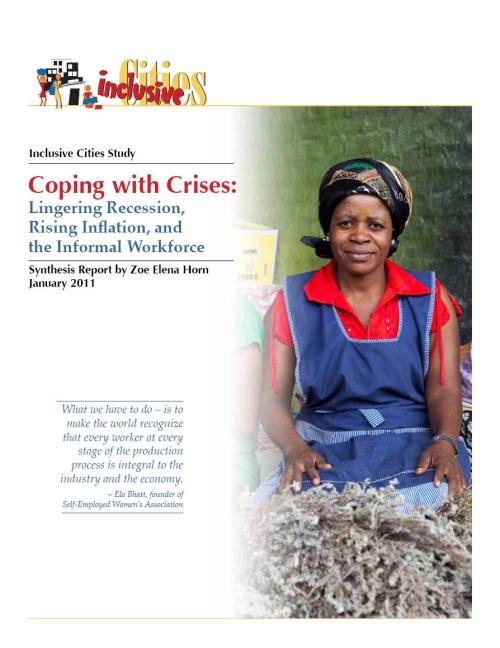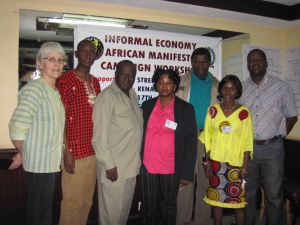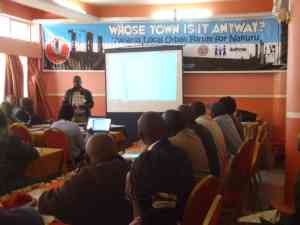It is well known that the global economic crisis of 2008 had severe and resounding effects on workers worldwide. In an effort to better understand the impact of the crisis on informal workers, The Inclusive Cities Project has conducted intensive research in 10 developing cities across the world which focuses on three types of informal economy workers: home-based workers, street vendors, and waste pickers.
The research was conducted in two rounds, one in 2009 and one in 2010. KENASVIT’s members in Nakuru’s Urban Alliance NASTHA took part in the research process during both rounds. A third round of research is being conceptualized, and will likely be undertaken towards the close of 2011. The research has so far resulted in the publication of two widely-cited reports:
- No Cushion to Fall Back On: The Global Economic Crisis and Informal Workers
- Coping with Crisis: Lingering Recession, Rising Inflation and the Informal Workforce
 Below, please find the executive summary and highlights from Round 2 of research:
Below, please find the executive summary and highlights from Round 2 of research:
In 2009, researchers in 14 urban locales in 10 countries across Africa, Asia and Latin America conducted individual and focus group interviews to investigate the impact of the economic crisis on workers in three segments of the informal economy: home-based work, street trade and waste collection. The research found there were significant negative effects, including declining demand, increased competition within the groups studied, as well as limited access to emergency or recovery measures for participants. The study concluded that the informal economy should not be viewed simply as a “cushion” for retrenched formal workers during crises, but that impacts of global economic trends and events since the beginning of the crisis on the informal workers and enterprises also need to be understood and addressed.
In 2010, researchers conducted a second round of research in 13 locales in nine countries with mainly (though not exclusively) the same sample, in order to assess whether there were signs of recovery for participating workers.
In spite of some positive developments, the Round 2 research suggests a lag in recovery for the informal workers in this study. Persistent unemployment and underemployment in the formal economy continues to drive new entrants into informal employment. Some respondents report stronger demand for their goods and services, but many continue to face low levels of sales or orders. Incomes have risen for some workers in absolute terms to mid-2009 levels, but not to pre-crisis levels and not at the rate of rising living costs. Persistently high inflation – affecting food and fuel prices in particular – have intensified pressure on family budgets. Respondents continue to restrict their families’ diets. School withdrawals, not common in the first round of study, appear to be on the rise.
Waste pickers: In Round 1, waste pickers had experienced the sharpest decline in demand and selling prices. Since then, at the industry level, prices for recovered materials appear to have largely recovered, but most waste pickers in early 2010 reported lower prices and lower volumes of accessible waste than the year before.
Home-based workers: In Round 1, sub-contracted and self-employed workers producing for global value chains previously reported a sharp decline in work orders and sales. In early 2010, sub-contracted workers reported some recovery in the volume of work orders due to stronger demand. This was not accompanied by any rises in piece rates, despite rising inflation in many study locations and evidence of higher rates for formal workers in nearby factories. Self employed workers producing mostly for domestic value chains experienced some recovery in demand, but less so than those producing for global markets.
Street vendors: In Round 1, street vendors reported a significant drop in consumer demand. In early 2010, demand had still not recovered for most vendors yet many had recently raised their prices due to higher costs of goods. Also, competition had increased from new entrants and from large retailers, who have aggressively targeted customers during the crisis.
Interviewees were asked to identify and prioritize interventions that would support their livelihoods. Short term emergency measures were not priorities; rather, respondents opted for support for their ongoing livelihood activities. This included access to financial services, skills training and market analysis and access. Wage protection, workplace improvements and a range of social protection measures were also identified as priority interventions.
Specifically, street vendors reported needing a secure place to vend in a good location, as well as access to low interest loans. Home-based workers indicated they required lower utility rates and greater inclusion in social insurance schemes. Waste pickers said they needed greater access to recyclable waste and incorporation in solid waste management schemes.
The global economic crisis brought new challenges to participants, but also exacerbated existing problems. Many participants were already living in a state of “crisis,” struggling daily to feed their families. Pre-crisis thinking, therefore, must not be applied in the present or in a post-crisis future, because the status quo for most informal workers will perpetuate poverty and inequality.
This report argues for a new stance on informality that places informal workers at the centre of employment schemes and social protection measures, and includes them in economic policies and urban planning. Without an inclusive approach to economic and social policy that integrates informal workers, poverty, vulnerability, and inequality will persist.
You can download and read the full report from Round 2 of research (2010), “Coping with Crisis: Lingering Recession, Rising Inflation and the Informal Workforce” here. You can also download the Round 1 report “No Cushion to Fall Back On: The Global Economic Crisis and Informal Workers” here.



